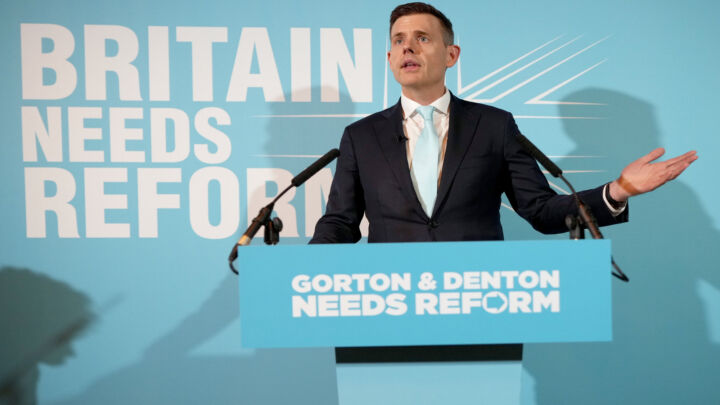Family court reform: a disaster for parents
In the name of efficiency, the Children and Families Act will make it easier to take children away from their parents.

Want unlimited, ad-free access? Become a spiked supporter.
This week, the Lib-Con coalition government enacted what it has called the ‘largest family-justice reform for a generation’. The Children and Families Act 2014, which came into effect on 22 April, allows for wide-reaching changes to the way that the family courts operate, including an extendable 26-week limit to care proceedings and limits on the use of expert-witness evidence. The family justice minister, Simon Hughes, said that the reforms ‘focus on the children’s needs rather than what parents see as their own rights’.
While the act makes provision for a number of sensible administrative changes to the family courts, such as ensuring that the same judge hears the same case throughout all the relevant hearings, the central point of the act is to make family justice more ‘efficient’. The act follows the independent Family Justice Review undertaken by David Norgrove in 2011, which concluded that the system is often subject to ‘unconscionable delay’ which was ‘fuelled’ by a judicial ‘distrust of local authorities’.
He continued: ‘It is of course right that we endeavour to keep families safely together, but we must also be quicker to recognise when this is not possible’. Peeling back the flowery language, the philosophy behind the reforms is clear: judges must be more willing to put children into the care of local authorities quickly.
This focus on ‘efficiency’ is symptomatic of a system which is drifting towards the Kafkaesque. Consider what Hughes means when he talks about ‘the children’s needs’ in the context of care proceedings. In 2001, the Labour government established the Children and Family Court Advisory and Support Service (CAFCASS). CAFCASS became the largest employer of social workers in England and Wales following the introduction of the role of the family court adviser (FCA). FCAs represented a new presence in the family courts, in the form of social workers who are instructed to represent the ‘interests of the child’ in care proceedings.
FCAs are instructed by the court to attend to families, interview parents and their children (often separately) and make ‘representations and recommendations to judges’ as to what is in the interests of the child.
I spoke to a family-law solicitor recently who had experience representing parents in care proceedings. She told me that because FCAs purport to represent the ‘interests of the child’, their findings can often be determinate in family-court proceedings. She said: ‘If you get a bad report, the case is more or less over for the parents.’ Another lawyer I spoke to said that, because of judges’ increasingly limited involvement, cases often ‘turn on a barrister’s ability to undermine the credibility of a social worker’. Lawyers can even instruct a private social worker in an attempt to undermine the findings of the CAFCASS representative.
The view from lawyers appears to be that the judge’s role in such cases is little more than as a rubber stamp for the views of government social workers, who function under the powerful mantle of ‘acting in the interests of the child’. The efficiency agenda embodied in the Children and Family Act is not only a snub to the rights of parents, but also an indication of the lack of trust that parliament has in judges to resolve cases fairly. When Hughes talks about advancing the interests of the child, what he is really talking about is advancing the gospel of the government social worker.
This is particularly worrying when you consider that CAFCASS states on its website that it ‘works within the strategic objectives agreed by [its] sponsor department and contributes to wider government objectives relating to children’. So when Hughes talks about the ‘needs of the child’, in a roundabout way he is in fact talking about the needs of CAFCASS’s ‘sponsor department’ within government. It is not difficult to see how this could become dangerous when UK education secretary Michael Gove has been responsible for appointing personnel to the CAFCASS board. Gove has previously boasted of ‘working hard to make it quicker to get children into care’.
Consider also the influence of children’s charities in the government’s approach to family intervention. Sir Martin Narey, the former chief executive of Barnado’s, undertook a review on behalf of Gove’s department into social-work training. It was Barnado’s who called for a 30-week limit to care proceedings, bemoaning how the ‘evident lack of credence given to social workers’ today is one of the causes of ‘significant delays’. In the end, the government opted for a time limit of 26 weeks. The words of Barnado’s are almost exactly replicated in the recommendations of Norgrove’s purportedly independent review.
The Children and Families Act might be the most significant reform of a generation, but it is also a development of a trend which was already well underway: the reorientation of the family courts around the efficient removal of children from their homes. As part of this reorientation, social workers are now playing an ever-greater role under the auspices of representing the interests of the child; the recommendations of openly interventionist children’s charities like Barnado’s are now being adopted almost word for word into a purportedly independent review and then on to the statute book; and mistrust of the judiciary’s ability to judge cases fairly has flourished. But most worryingly, the reorientation of the family courts has transformed the rights of parents in the courtroom into inconveniences to be overcome, as nothing more than ‘what they see’ as their rights. Rights, that is, which have no real meaning or substance whatsoever.
Luke Gittos is law editor at spiked, a solicitor practicing criminal law and convenor of the London Legal Salon.
£1 a month for 3 months
You’ve hit your monthly free article limit.
Support spiked and get unlimited access.
Support spiked – £1 a month for 3 months
spiked is funded by readers like you. Only 0.1% of regular readers currently support us. If just 1% did, we could grow our team and step up the fight for free speech and democracy.
Become a spiked supporter and enjoy unlimited, ad-free access, bonus content and exclusive events – while helping to keep independent journalism alive.
———————————————————————————————————————————–
Exclusive January offer: join today for £1 a month for 3 months. Then £5 a month, cancel anytime.
———————————————————————————————————————————–
Monthly support makes the biggest difference. Thank you.










Comments
Want to join the conversation?
Only spiked supporters and patrons, who donate regularly to us, can comment on our articles.